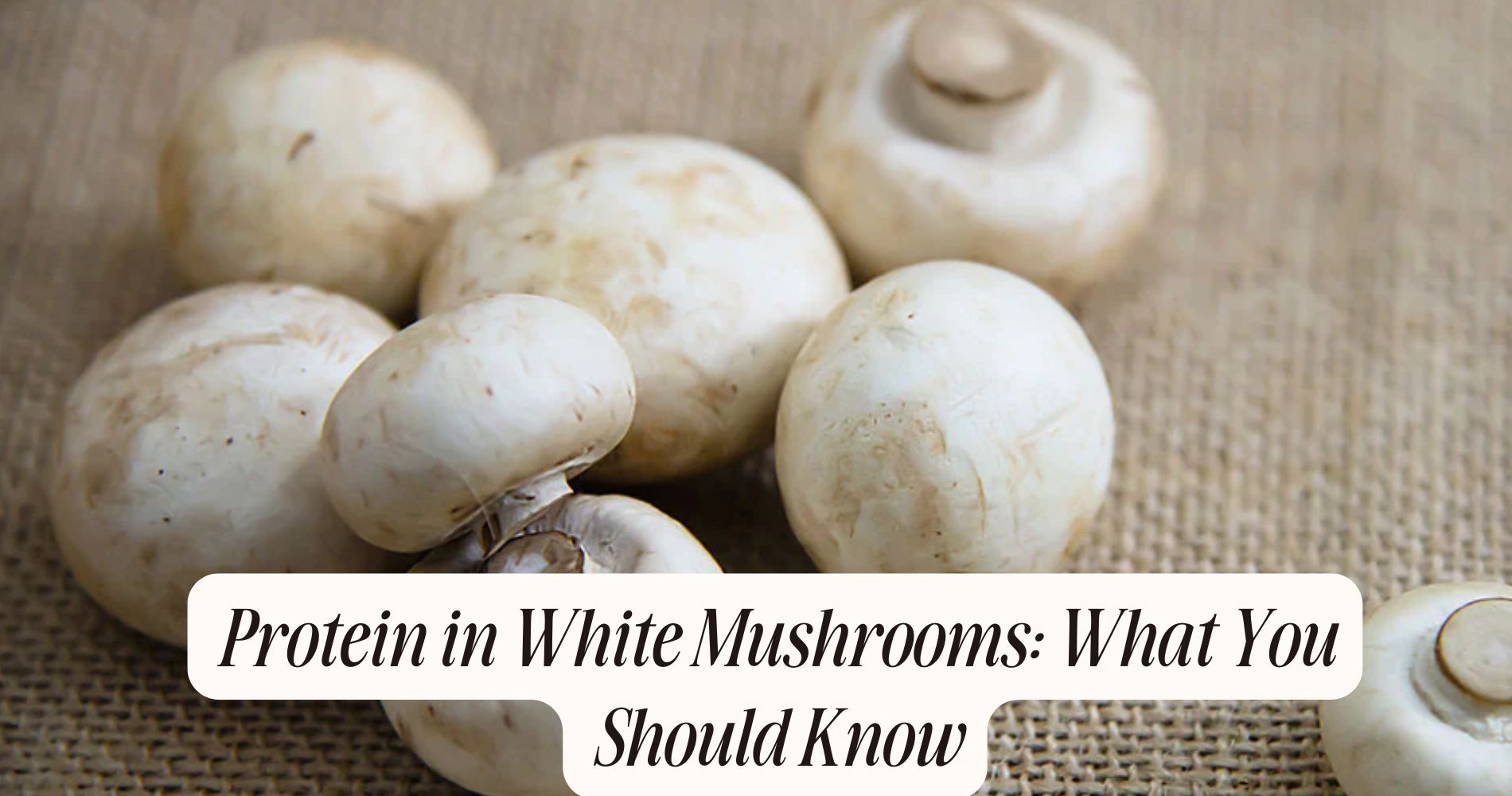
Why Are Mushrooms Good for You? Top Benefits
Why are mushrooms good for you? Mushrooms are incredibly beneficial for your health, packed with nutrients while being low in calories. They support your immune system and help lower cholesterol, contributing to heart health. Rich in antioxidants, they combat free radicals, protecting your cells. Mushrooms also enhance gut health by acting as probiotics and improving digestion. They can even boost mood and cognitive function, especially varieties like Lion's Mane. Additionally, their culinary versatility makes them an easy addition to your meals. If you're curious about more specific benefits and delicious ways to incorporate them into your diet, there's plenty more to explore.
Nutrient-Rich Profile
When you immerse yourself in the world of mushrooms, you'll discover a nutrient-rich profile that offers numerous health benefits. Different mushroom varieties boast unique nutritional attributes, making them a versatile addition to your diet.
For instance, shiitake mushrooms contain polysaccharides, which support cardiovascular health, while oyster mushrooms provide a good source of plant-based protein and fiber.
In nutritional comparisons, you'll find that mushrooms are low in calories yet high in essential vitamins and minerals. They're rich in B vitamins, particularly riboflavin and niacin, which play crucial roles in energy production and metabolism.

Additionally, mushrooms are a notable source of vitamin D, especially when exposed to sunlight or UV light.
Moreover, mushrooms are packed with antioxidants, such as ergothioneine, which can help protect your cells from damage. They also contain selenium, which supports thyroid function and may reduce inflammation.
Incorporating a variety of mushrooms into your meals not only enhances flavor but also boosts your overall nutritional intake, promoting better health and well-being.
Enjoy exploring the diverse world of mushrooms and their unique health benefits!
Immune System Support
Mushrooms not only enhance your meals with their rich flavors but also play a significant role in bolstering your immune system. They're packed with unique fungal compounds, such as beta-glucans, which have been shown to stimulate your immune response.
By incorporating mushrooms into your diet, you're giving your body a natural boost to fend off illnesses.
Research indicates that these compounds activate immune cells, enhancing their ability to detect and destroy pathogens. This means that when you enjoy mushrooms, you're not just savoring their taste; you're also equipping your body to better combat infections.
Additionally, mushrooms contain antioxidants, which help reduce inflammation and oxidative stress. This further supports your immune system in maintaining overall health.
Varieties like shiitake, maitake, and reishi are particularly known for their immune-enhancing properties.

Incorporating a variety of mushrooms into your meals can be an easy and delicious way to strengthen your body's defenses.
Heart Health Benefits
When it comes to heart health, mushrooms can play a significant role in cholesterol regulation and blood pressure control.
Research shows that the compounds found in mushrooms help lower LDL cholesterol levels, promoting better cardiovascular health.
Additionally, their high potassium content can assist in managing blood pressure effectively.
Cholesterol Regulation
Cholesterol levels play an essential role in heart health, and incorporating mushrooms into your diet can help manage these levels effectively. Research suggests that mushrooms can reduce cholesterol absorption, promoting healthier overall cholesterol levels. They contain compounds like beta-glucans, which have been shown to lower LDL cholesterol—often referred to as "bad" cholesterol.
Additionally, mushrooms support cholesterol metabolism. Their rich fiber content aids in digestion and helps your body process fats more efficiently. When you consume mushrooms, you're not just adding flavor to your meals; you're also enhancing your body's ability to regulate cholesterol levels.
Studies indicate that regular consumption of mushrooms can lead to improved lipid profiles, which is significant for heart health. By replacing high-fat, high-cholesterol ingredients with mushrooms, you can create heart-healthy meals that are both nutritious and delicious.
Blood Pressure Control
Studies have shown that incorporating mushrooms into your diet can considerably aid in blood pressure control. Their rich nutrient profile, including potassium, helps counteract sodium's effects, which is crucial for hypertension management.
Potassium promotes vasodilation, allowing blood vessels to relax and reducing overall blood pressure.
Mushrooms, particularly varieties like shiitake and portobello, are low in calories and high in fiber. This makes them an excellent choice for dietary inclusion, as they can easily fit into various meals without contributing to weight gain—another factor that can impact blood pressure.
Research indicates that the antioxidants found in mushrooms may also play a role in heart health by reducing oxidative stress, which can lead to inflammation and higher blood pressure levels.
Antioxidant Properties
Mushrooms are rich in antioxidants, making them a powerful addition to your diet.
These compounds help combat free radicals, which can damage your cells and contribute to aging and disease.
Rich in Antioxidants
While many foods boast health benefits, few can match the impressive antioxidant properties found in mushrooms. These fungi aren't only delicious but also pack a powerful punch when it comes to fighting oxidative stress.
Various mushroom varieties, such as shiitake, maitake, and reishi, contain high levels of antioxidants like ergothioneine and glutathione. These compounds play a vital role in neutralizing harmful free radicals in your body.
In fact, an antioxidant comparison between mushrooms and other common foods reveals that mushrooms often outperform many fruits and vegetables. For instance, studies have shown that certain mushrooms can have higher antioxidant levels than blueberries, a popular superfood. This makes them an excellent addition to your diet if you're looking to boost your antioxidant intake.

Incorporating mushrooms into your meals can be a simple yet effective way to enhance your overall health. Whether you sauté them, add them to soups, or toss them in salads, you're not just enjoying their rich flavors; you're also benefiting from their potent antioxidant properties.
Combat Free Radicals
Regularly incorporating mushrooms into your diet can significantly help combat free radicals due to their rich antioxidant content. These fungi contain various bioactive compounds, including polyphenols and selenium, which enhance antioxidant mechanisms in your body. By consuming mushrooms, you boost your body's ability to neutralize harmful free radicals that contribute to oxidative stress.
Oxidative stress can lead to cell damage, inflammation, and several chronic diseases, including cancer and heart disease. Mushrooms' antioxidant properties work through free radical scavenging, effectively reducing the number of reactive oxygen species in your system. This scavenging action helps maintain cellular integrity and supports overall health.
Research has shown that certain mushroom varieties, such as shiitake and maitake, are particularly high in antioxidants. By including these mushrooms in your meals, you're not just adding flavor but also fortifying your body's defenses against oxidative damage.
Weight Management Aid
Incorporating mushrooms into your diet can be a strategic approach to weight management. Low in calories but high in nutrients, mushrooms have a low caloric density, making them an excellent food choice when you're trying to lose or maintain weight. By replacing higher-calorie ingredients in meals with mushrooms, you can enjoy satisfying portions without overloading on calories.
Mushrooms are also beneficial for appetite control. Their unique texture and umami flavor can enhance the overall satisfaction of your meals, helping you feel full longer. Studies suggest that meals rich in vegetables, including mushrooms, can promote satiety, leading to reduced calorie intake throughout the day.
Furthermore, the fiber content in mushrooms aids digestion and contributes to a feeling of fullness, which can prevent overeating. By adding mushrooms to salads, stir-fries, or soups, you can create filling dishes that help you stay on track with your weight management goals.
Blood Sugar Regulation
Mushrooms can also play a significant role in blood sugar regulation, making them a valuable addition to your diet beyond weight management. Research shows that certain types of mushrooms, like shiitake and maitake, can enhance insulin sensitivity, which is essential for maintaining stable blood sugar levels.

When you include these mushrooms in your meals, you're not just adding flavor; you're actively supporting your body's ability to manage blood sugar. Improved insulin sensitivity can lead to better glucose uptake by your cells, helping to prevent spikes in blood sugar after meals. This is particularly beneficial for those at risk of developing type 2 diabetes or managing their current condition.
Additionally, mushrooms are low in calories and carbohydrates, making them a smart choice for a balanced diet. They provide essential nutrients and antioxidants that promote overall health while keeping your blood sugar levels in check.
Gut Health Improvement
When it comes to gut health improvement, mushrooms offer a wealth of benefits that can enhance your digestive system. These fungi serve as excellent probiotic sources, promoting a healthy gut microbiome.
They're rich in fiber content, which aids in digestion and helps maintain regular bowel movements. This fiber acts as a prebiotic, fostering the growth of beneficial gut bacteria.
Mushrooms also contain essential digestive enzymes that facilitate nutrient absorption, ensuring you get the most out of your meals. The fermentation benefits of mushrooms can further enhance gut health by producing short-chain fatty acids, which contribute to inflammation reduction in the digestive tract.
This is vital for maintaining an ideal gut-brain axis, as a balanced gut can positively influence mental health.
Incorporating mushrooms into your diet supports overall digestive health by enhancing nutrient absorption and reducing inflammation.
Whether you enjoy them in soups, stir-fries, or salads, these versatile foods deliver significant improvements to your gut health.
Mental Well-Being Boost
Mushrooms can greatly boost your mental well-being by enhancing your mood and supporting cognitive function.
Certain varieties, like lion's mane and reishi, are known for their potential to reduce stress and improve emotional balance.
Incorporating these fungi into your diet might just be the natural lift you need for a healthier mind.
Mood Enhancement Properties
Exploring the mood-enhancing properties of certain mushrooms can lead to significant improvements in mental well-being. Many varieties, such as Lion's Mane and Reishi, have been shown to promote mood stability and emotional balance. These mushrooms act as natural antidepressants, providing a serotonin boost that can help alleviate feelings of sadness and anxiety.

Research indicates that the neuroprotective effects of these fungi may also support brain health, enhancing your resilience against stress. Incorporating mushrooms into your diet can contribute to stress relief, making it easier to cope with daily challenges. The anti-inflammatory properties found in some mushrooms further support anxiety reduction, helping you maintain a calmer state of mind.
Additionally, mushrooms can enhance mindfulness, encouraging you to stay present and focused. This increased awareness can lead to better emotional regulation, helping you navigate life's ups and downs more effectively.
Cognitive Function Support
Building on the mood-enhancing benefits of mushrooms, their impact on cognitive function is equally significant. Studies suggest that certain varieties, like lion's mane, can promote memory enhancement and overall brain health. This mushroom contains compounds that stimulate the production of nerve growth factor (NGF), a protein essential for the growth, maintenance, and survival of neurons.
When you incorporate mushrooms into your diet, you're not just improving your mood; you're also potentially boosting your cognitive abilities. Research has shown that regular consumption can enhance memory retention and cognitive flexibility, making it easier for you to learn and adapt to new information.
Additionally, mushrooms are rich in antioxidants, which combat oxidative stress—one of the factors that can lead to cognitive decline. By protecting your brain cells and supporting their function, mushrooms help maintain clarity and focus over time.
Incorporating mushrooms into your meals or supplements can be a simple yet effective way to support your cognitive health. So, if you're looking to sharpen your mind while enjoying delicious flavors, mushrooms might just be the perfect addition to your diet.
Stress Reduction Effects
Numerous studies have found that certain mushroom varieties can greatly reduce stress levels and enhance mental well-being. For instance, mushrooms like reishi and lion's mane have been shown to lower cortisol levels, the hormone primarily responsible for stress. By incorporating these mushrooms into your diet, you can support your body's natural stress relief techniques.
Additionally, mushrooms may promote feelings of calm and clarity, which can be beneficial when you're practicing mindfulness. Consuming these fungi can complement your mindfulness practices by improving focus and reducing anxiety. When you're more centered, you're better equipped to handle life's challenges.
Research suggests that the bioactive compounds in mushrooms can also positively influence neurotransmitters such as serotonin and dopamine, which play an essential role in mood regulation. By enhancing these neurotransmitter levels, mushrooms can help mitigate feelings of stress and anxiety.
Incorporating mushrooms into your diet not only offers nutritional benefits but also serves as a natural ally in your journey toward improved mental well-being.
Skin Health Enhancement
While you may not immediately think of mushrooms as a skincare ally, they offer remarkable benefits for skin health. These fungi are packed with antioxidants and essential nutrients that can improve skin hydration, making your complexion look plump and vibrant.
Certain types of mushrooms, like reishi and shiitake, are known for their anti-aging effects, enhancing collagen production that boosts skin elasticity and firmness.

Mushrooms also play a role in acne prevention. Their natural anti-inflammatory properties help reduce inflammation, which can lead to breakouts. By supporting wound healing, they contribute to a healthier skin barrier, allowing your skin to defend against environmental stressors.
Moreover, mushrooms provide UV protection, helping to shield your skin from harmful sun rays. They can also assist with pigmentation control, evening out skin tone and reducing dark spots.
With their ability to combat inflammation and enhance overall skin health, incorporating mushrooms into your skincare regimen can offer significant benefits. So, next time you think about improving your skin, don't overlook the power of these natural wonders.
Versatile Culinary Uses
Mushrooms aren't just beneficial for your skin; they're also incredibly versatile in the kitchen. With a wide range of mushroom varieties, you can enhance flavors, textures, and nutritional profiles in countless dishes. From the earthy notes of shiitake to the delicate taste of enoki, each variety brings something unique to the table.
You can use various culinary techniques to prepare mushrooms. Sautéeing quickly caramelizes their natural sugars, while grilling adds a smoky depth. Roasting intensifies their umami flavor, making them a perfect addition to salads or grain bowls.
You can even blend them into soups for a rich, hearty base. Mushrooms also shine in vegetarian and vegan dishes, serving as a satisfying meat substitute. Stuffed mushrooms can be a delightful appetizer, and mushroom risottos are creamy and comforting.
Don't forget about dried mushrooms, which pack concentrated flavors and can be rehydrated for soups, sauces, or pasta dishes.
With their adaptability and health benefits, mushrooms deserve a prominent place in your culinary repertoire. So, experiment with different mushroom varieties and cooking techniques to elevate your meals.
Experience Mushroom Benefits the Easy Way with Well Gummies SUPER MUSHROOM GUMMIES
Curious about why are mushrooms good for you? Well Gummies SUPER MUSHROOM GUMMIES bring the incredible health benefits of ten functional mushrooms into a convenient, delicious gum chew form. These vegan gummies are designed to boost your immune system, sharpen focus, and provide calmer, sustained energy for a balanced body and clear mind.
With a delightful wild berry flavor, they’re as enjoyable as your favorite candy, minus the jitters or crashes. Incorporate Well Gummies into your routine for an effortless way to enjoy the power of mushrooms every day!
Frequently Asked Questions
Are There Any Risks Associated With Consuming Mushrooms?
Yes, there are risks associated with consuming mushrooms. Mushroom toxicity varies, so you must guarantee proper identification. Eating wild mushrooms without knowledge can lead to severe illness or even death, so always exercise caution.
How Can I Incorporate More Mushrooms Into My Diet?
You can easily incorporate mushrooms into your diet by exploring various mushroom recipes. Try sautéing them with vegetables, adding them to soups, or blending them in smoothies, catering to your dietary preferences for a nutritious boost.
Can Mushrooms Cause Allergic Reactions in Some Individuals?
Yes, mushrooms can cause allergic reactions in some individuals. These mushroom allergies occur when your immune response overreacts to proteins in mushrooms, leading to symptoms like skin rashes, gastrointestinal issues, or respiratory problems. Stay cautious!
Are Wild Mushrooms Safer Than Store-Bought Varieties?
Wild mushrooms aren't necessarily safer than store-bought ones. You should always follow foraging guidelines to avoid toxic varieties. Educate yourself on mushroom identification to guarantee your safety when gathering wild mushrooms.
Do Cooking Methods Affect the Health Benefits of Mushrooms?
Yes, cooking techniques do affect mushrooms' health benefits. Methods like steaming or sautéing can enhance nutrient retention, while boiling may lead to nutrient loss. Choosing the right technique maximizes the advantages mushrooms offer your diet.
Conclusion
Incorporating mushrooms into your diet can offer a wealth of health benefits. Their nutrient-rich profile supports immune function, promotes heart health, and aids in weight management. The antioxidant properties combat oxidative stress, while their role in gut health can enhance digestion. Additionally, mushrooms may boost mental well-being and improve skin health. With their versatility in culinary uses, adding mushrooms to your meals is an easy way to elevate your nutrition and overall health.




